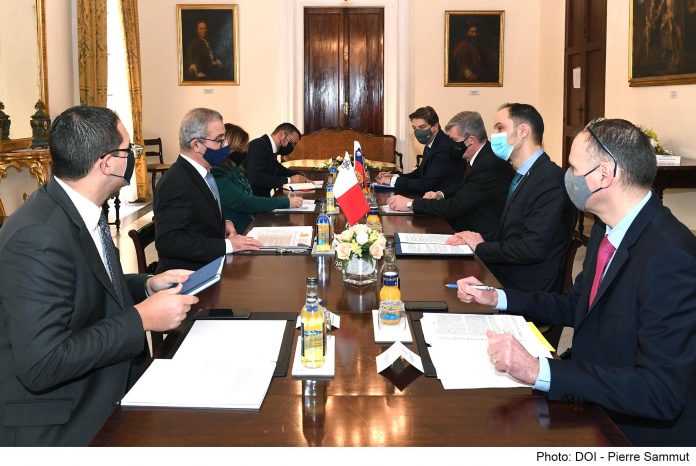Minister for Foreign and European Affairs Evarist Bartolo held a bilateral meeting with Minister of Foreign Affairs of Slovenia Anže Logar.
Throughout the talks, both sides addressed various issues including developments in the Mediterranean, irregular migration, and Slovenia’s priorities for the next Presidency of the Council of the European Union.
Minister Evarist Bartolo explained how the two countries have many things in common which offer a solid foundation for cooperation in various fields. Among them is the Mediterranean, with Minister Bartolo reiterating that the fate of the European Union is intrinsically linked to the fate of the Mediterranean and the fate of Africa.
In this context, Minister Bartolo said that Malta is ready to support Slovenia’s membership in the Med 7, and stressed that with strong cooperation between them, this could be a formidable group in the European Union.
The Minister also spoke about irregular migration, explaining the great challenges of Malta as an island state on the southern border of Europe. He explained that arrivals were no longer limited to the summer months, and that, without the cooperation of the Libyan Coast Guard, the European Union would have faced a major humanitarian crisis.
In this regard, he reiterated that while we must continue to work for a united Libya and strengthen the Libyan Coast Guard, the only long-term solution is for migrants to remain in their country, where there is sufficient wealth and where they are needed to build resilient economies.
On his part, Minister Anže Logar welcomed Malta’s commitment to support Slovenia in its ambition to join the Med 7, and said that this was timely because it would coincide with Slovenia’s term at the helm of the Council of the European Union – a role through which it can promote the interests of said group of Mediterranean countries.
In relation to the Presidency of the Council of the European Union, Minister Anže Logar said Slovenia’s priorities include strengthening the bloc’s resilience, building a robust European health system, strengthening the EU’s crisis management capacity (not just in the field of health but also in other areas, including irregular migration), strengthening the rule of law, promoting the European way of life, supporting transatlantic cooperation, and strengthening the strategic autonomy of the European Union.
The two sides agreed to work together to reach these important goals, and to further strengthen their relations for the mutual benefit of the two peoples.










